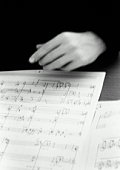
Home > Ear Training > What's the Importance?
|
||||
The Importance of Ear Training for Singers and Musicians
The importance of ear training for singers and musicians is especially important for instruments that can be used to manipulate microtones or fretless stringed instruments. However, it still is an important skill for being able to play a musical instrument properly, especially when performing with other instruments. Ear training is an integral part of playing any instrument which requires using techniques to directly manipulate the pitch in a way that does not automatically cause the instrument to play an actual note. For example, singers directly control the pitch of their voice when performing. Without ear training, a singer would not be able to sing the correct pitches of notes. Violins, violas, some bass guitars and many other stringed instruments do not have frets or usually any frame of visual reference for notes. As a result the musicians must very precisely press the string into exactly the right location to get the precise note they want to play. Ear training is required to make sure you are not off pitch. Instruments, like the guitar and harmonica, which normally only produce musical notes when played, have techniques that manipulate pitch in a way that requires ear training.
Many musicians on almost any instrument have very sloppy playing techniques because they cannot evaluate whether or not they are playing properly. For example, a piano player without proper ear training might not notice when they hit incorrect keys or if they are bleeding notes together because they are holding down the sustain pedal too long. Ear training is also an important part of composition, which is a skill potentially used by any musician. Contrary to what many people think, music theory is not intended to allow you to completely write a song without knowing what it sounds like. In some cases, something that seems good in theory might not end up sounding good when actually played. For example, a note in a melody might be dissonant when played over a chord in the progression. You need ear training to be able to evaluate how well your compositions sound. Ear training is even more important for composers that do more unconventional things, like making heavy use of dissonant notes, since it is more difficult to create a good song using those sorts of techniques. Many music students neglect the importance of ear training for singers and musicians and focus on more physical techniques. In some cases, that student can eventually go back and develop their ear training when their physical techniques cannot progress further without proper ear training. However, starting ear training early in learning to sing or play an instrument makes developing your abilities as a musician much easier in the long run.
| ||||
|
Although every attempt has been made to make information as accurate as possible, we are not responsible for any errors that may appear.
 Ear training is an important skill for singers and musicians to develop. While it
does not have the obvious benefits of many of the skills used to directly manipulate an instrument, it does
have a substantial impact on playing ability.
Ear training is an important skill for singers and musicians to develop. While it
does not have the obvious benefits of many of the skills used to directly manipulate an instrument, it does
have a substantial impact on playing ability.
 The importance of ear training for singers and musicians is not solely
regulated to instruments that can directly manipulate pitch. You cannot evaluate whether you are playing a
piece correctly without some form of ear training.
The importance of ear training for singers and musicians is not solely
regulated to instruments that can directly manipulate pitch. You cannot evaluate whether you are playing a
piece correctly without some form of ear training.


